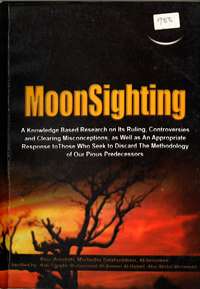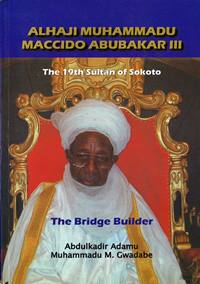Moonsighting
 On 12 September Muslims all over the world celebrated the Sacrificial Feast (Eid al-Adha). Every year the uncertainty of the lunar date to which this feast is linked, instigates religious disputes about the correct determination. The Nigerian book Moonsighting: a knowledge based research on its ruling, controversies and clearing misconceptions as well as an appropriate response to those who seek to discard the methodology of our pious predecessors written by Abu ‘Aaishah Murtadha Salahuddeen al-Iwoowee, a reformist preacher hailing from Iwo, offers an insight into these debates, and in doing so sheds light on shifting perceptions on Muslim authority, the nation-state, and Christian-Muslim relations in Africa.
On 12 September Muslims all over the world celebrated the Sacrificial Feast (Eid al-Adha). Every year the uncertainty of the lunar date to which this feast is linked, instigates religious disputes about the correct determination. The Nigerian book Moonsighting: a knowledge based research on its ruling, controversies and clearing misconceptions as well as an appropriate response to those who seek to discard the methodology of our pious predecessors written by Abu ‘Aaishah Murtadha Salahuddeen al-Iwoowee, a reformist preacher hailing from Iwo, offers an insight into these debates, and in doing so sheds light on shifting perceptions on Muslim authority, the nation-state, and Christian-Muslim relations in Africa.
Moonsighting
In many Muslim societies the determining of the beginning of the new lunar months is confused by local debates and emotional upheaval. Based on Islamic prescriptions it is not the actual birth of the Astronomical New Moon which marks the start of the Islamic month, but rather the visibility of the new crescent. This lunar crescent visibility depends on a number of factors such as the location of the observer, sky conditions and the moon’s distance from the earth. These variables usually make it impossible to see the new moon within 24 hours after the Astronomical New Moon, although occasionally sightings between 12 and 15 hours have been reported. The different sightings for each month, reported at the website moonsighting.com, result in different dates of public holidays.
Uncertain dates of public holidays
This issue is most relevant for Muslims at the start of the Ramadan (annual fasting month), the beginning of Shawwal (Eid al-Fitr festival) and the Dhul-Hijja month in which the pilgrimage (hajj) to Mecca takes place. Although the hajj rites are primarily confined to the sacred precincts in Saudi Arabia, the Sacrificial Feast (Eid al-Adha) which marks the end of the ceremonies is celebrated all over the world by communal prayers and the sacrifice of sheep, cows and camels at the 10th of the Dhul Hijja (this year corresponding with 12 September 2016). Every year the uncertainty of the lunar date triggers the publications of numerous articles, pamphlets, mosque lectures, letters to the editor and books in all countries with sizeable Muslims populations. Some years show up to four different dates for the Eid al-Adha, but this year there was a remarkable consensus for September 12; only New Zealand, Pakistan and India celebrated their public holiday one day later.
Local and global debates
From a social scientific perspective these debates are important phenomena to understand shifting perceptions on Muslim authority, the nation state, and Christian-Muslim relations in Africa and as such the ASC library acquires materials elucidating the theological, social and political context of these discourses. Abu ‘Aaishah al-Iwoowee’s book Moonsighting, a recent acquisition published in 2010, contains 251 pages and is endorsed by the biographer of Muhammad Nasiruddin al-Albani, Muhammad Abdil Musawwir. Throughout the book the author refers to Abdil Musawwir as ‘my shaykh’, indicating an intimate student-teacher relationship. Together with the dedication to the 18th sultan and former head of the Supreme Council for Islamic Affairs Ibrahim Dasuki this places the book right in the middle of Islamic reformism. This is further corroborated by the title which advocates a return to the “methodology of our pious predecessors” apparently a translation from the Arabic al-minhaj al-salafi. According to a footnote he also wrote a book in Arabic on the question whether the day starts at sunset or at dawn.
Content
Although Moonsighting emphatically attempts to discuss the topic with arguments derived from timeless canonical sources, the book is clearly directed against fellow Muslims both from Nigeria and beyond. The author’s main opponents from the global stage are Khalid Shaukat, the driving force behind the website moonsighting.com, and Qamar Uddin, a UK scholar who extensively published on the subject. A local writer he targets is the Nigerian lecturer in the Department of Physics (University of Maiduguri), Salihu Buba Zubairy. According to Abu‘Aaishah there are only two ways to get authoritative knowledge about the beginning of the new lunar month: naked eye observation or counting 30 days since the beginning of the previous month. The use of optical aids like telescopes or astronomical calculations are forbidden according to him. Even the screening of sighting reports against accepted astronomical knowledge, should not interfere in this religious discussion. Whenever the moon is sighted by one reliable witness at any place on the globe, and this sighting is endorsed by a Muslim authority, this should mark the beginning of the new lunar month, Abu ‘Aaishah claims. Modern means of communication may be used to spread this message. The lesson of this book is summarized by him as: “What is the Truth? Is it science and technology or the Sunnah of the prophet? No Muslim argues this answer” (p. 226).
Contested religious, political and scientific authorities

There are several points in Abu‘Aaishah’s book which will not go down well with many Muslims today (for example his claim that the moon is a luminous object, giving light of its own, p. 67). The major weakness is that he hardly defines which “Islamic authority in place” (p. 134) should sanction a global moon sighting. It looks like he sees a role for Saudi Arabia in this field, especially when it comes to determining the days of the hajj: “the kingdom of Saudi Arabia is holding fast to that which the prophet (p.u.h.) and the righteous predecessors were upon by affirming the beginning and end of the month of Ramadan, the ‘Eids and times of hajj and their likes with the sighting of the moon. (p. 92, cf. p.134).
Most of the discussions surfacing in current Nigeria are dealing with this issue of contested authority. For example when the current Sultan of Sokoto, Alhaji Sa’ad Abubakar III, announced on Friday September 3 2016 that the Eid-al-Adha would be celebrated on Monday 12th, twenty-two Christian groups criticized the Federal government and implicitly the Muslim president Buhari of taking orders from a religious spokesperson. A similar discussion took place in July this year in regard to Buhari’s sudden extension of the Eid-el Fitr holidays with one day. The Muslim Rights Concern (MURIC) defended the Sultan’s announcement and explained that the thin line between religion and politics had not been crossed:
groups criticized the Federal government and implicitly the Muslim president Buhari of taking orders from a religious spokesperson. A similar discussion took place in July this year in regard to Buhari’s sudden extension of the Eid-el Fitr holidays with one day. The Muslim Rights Concern (MURIC) defended the Sultan’s announcement and explained that the thin line between religion and politics had not been crossed:
“There is a difference between declaration of Sallah day and declaration of a public holiday. Only the Federal Government can declare a public holiday in the country while governors alone can declare it in their states. But the Sultan reserves the right to declare the day for a Muslim festival. The Sultan based the announcement on Saudi’s declaration of Sunday 11th September as Arafat Day. Normally, the following day should be Sallah day.”
Books like Moonsighting are essential reading in order to better understand these contestations of authority and place them in both local and global contexts.
Gerard C. van de Bruinhorst

